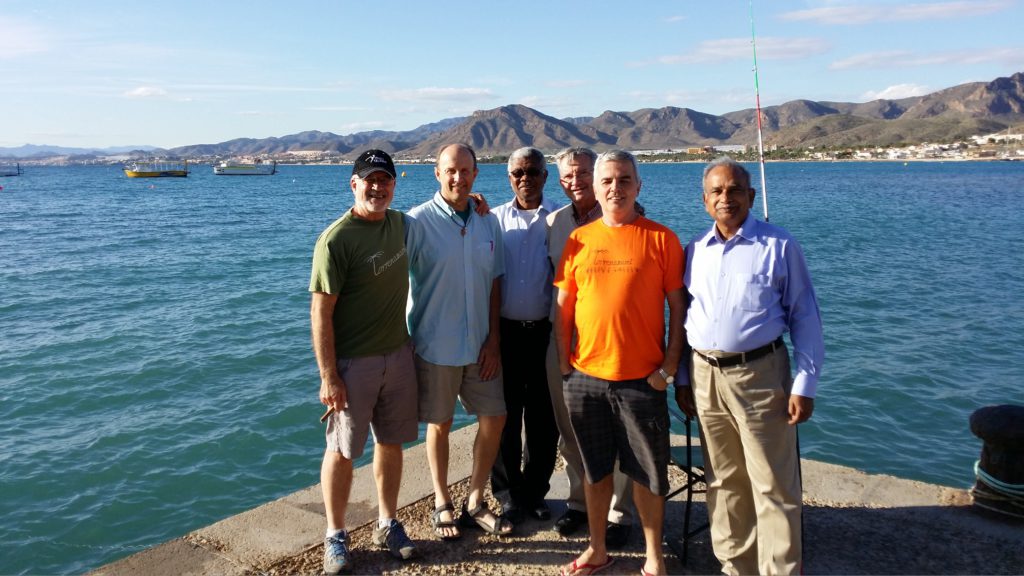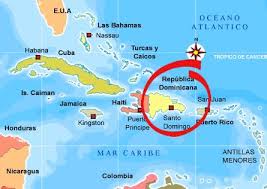Author Archives: Fraternidad Iesus Caritas
(Español) NOTICIAS Y COMUNICACIONES Nº159
(Español) Javier PINTO, Ficha 5 del Año de la Misericordia: VETE Y HAZ TÚ LO MISMO
(Español) Antonio SICILIA: Carlos de FOUCAULD, un profeta para nuestro tiempo.
INTERNATIONAL TEAM, KANSAS 2016
 Between 17 and 27 October our international team of the Fraternity for Priests Iesus Caritas will be assembled in Kansas City, United States, hosted by Mark.
Between 17 and 27 October our international team of the Fraternity for Priests Iesus Caritas will be assembled in Kansas City, United States, hosted by Mark.
We are going to work the themes of the fraternity we carry on agenda and have all brothers and fraternities at our desk, our prayers and our heart.
Pray also for us, and for the sick brothers or with difficulties; by the brothers from all continents; the new fraternities and the projects that we have to face. Thanks to each and every one of you. Jesus bless us all and brother Charles illuminate the way.
(Español) Boletín Horeb, octubre 2016
TONY PHILPOT, in the peace of the Lord
Monsignor Anthony John Philpot (always known as ‘Tony’) died on July 16th 2016 aged 81 at the Little Sisters of the Poor Convent, North London. The funeral tribute spoke of his gifts as a parish priest and the many additional responsibilities he had held in the dioceses of Northampton and East Anglia. His brother priests in Jesus Caritas have particular cause to give thanks for the contribution he made to the Fraternity.
Elected as International Responsible at the Assembly of Santo Domingo in 1982 he gained a deep understanding of the Fraternity. He saw clearly that no single region has a complete grasp of Br Charles’ charism but that each one emphasises a different aspect. Thus, no one has a monopoly but rather we all need one another to discover the unfolding richness of the gift God has given us in the life of this extraordinary man. Hence the need to come together, to communicate.
Tony was an amazing linguist who even in the last weeks of his life was seen studying Rumanian in an effort to converse in their own language with some of the workers in the convent. Not to display his own cleverness but as a way of meeting the other on their own ground and making them feel comfortable and valued. In this way he tried to be a ‘universal brother’.
Almost all of his priestly life Tony was a parish priest but he was also a wise and generous pastor for his fellow clergy. His writings on priesthood were widely read. For five years he was spiritual director to seminarians in Rome. He was greatly in demand as a retreat giver and to us in the English Fraternity he never said ‘no’. It was only his final illness that prevented him from leading our latest Month of Nazareth. The booklets he wrote on the Fraternity still retain their freshness thirty years later.
A fitting legacy to us in Jesus Caritas can be found in the final words of Tony’s report as retiring general responsible where he urges each member to use the means that the Fraternity gives us (adoration, review of life, gospel sharing, desert, month of Nazareth…) “In using all these means and remaining faithful, we are the Jesus Caritas Fraternity of Priests, a precious resource for the universal Church.”
PDF: tony-philpot-in-the-peace-of-the-lord
Tony PHILPOT, our dear brother
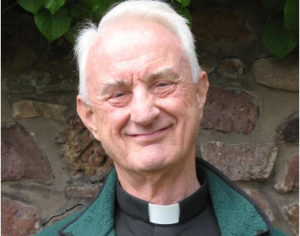 Former Diocese of East Anglia Vicar General and Spiritual Director at the Venerable English College in Rome, Mgr Tony Philpot, has died at the age of 81. Mgr Tony Rogers pays tribute.
Former Diocese of East Anglia Vicar General and Spiritual Director at the Venerable English College in Rome, Mgr Tony Philpot, has died at the age of 81. Mgr Tony Rogers pays tribute.
Anthony (always known as Tony) John Philpot was born on March 24, 1935 in Croydon, the eldest child of William and Josephine. When war broke out his father’s office was moved to Bedford, and he subsequently went to Bedford School, alma mater of John Bunyan.
In 1953 Tony began his studies for the priesthood at the Venerable English College in Rome, and was ordained in 1959 at the Basilica of St John Lateran, completing his Licentiate in Theology the next year, and returning to the Diocese of Northampton to serve as assistant priest, first at St Joseph’s, Bedford and then at Northampton Cathedral.
His first pastoral charge was in Leighton Buzzard, and, thereafter all his parish appointments were in what later became the Diocese of East Anglia. He took over the parish of St Mark’s in Ipswich, when the Franciscans left, and was later moved to Newmarket, following a short spell working with the Society of St James in South America.
In 1980, Bishop Alan Clark asked him to move to Our Lady and the English Martyrs in Cambridge, where he remained for 14 years. His time there, where his gifts as a talented preacher and a gentle pastor were much appreciated, was one of change. Though the liturgical wars which had dogged his predecessor, Canon Paul Taylor, were over, Tony was involved in major reorganisation of Catholic state secondary education in Cambridge, as well as a major and much needed refurbishment of the rectory.
When the Diocese of East Anglia was established in 1976, Bishop Alan Clark asked him to take charge of religious education, and later appointed him as one of his vicars general. The 1980s was a time when mutual support for the priests of the diocese was given high priority and Tony was given responsibility to head up the Ministry to Priests programme.
He had also become involved in the Jesus Caritas Fraternity, inspired by the spirituality of Charles de Foucauld, for which he eventually became the worldwide responsable. This took him out of the country for a considerable time each year, and as a seasoned traveller to all corners of the globe, he soon learnt the perils of delayed and lost luggage. So, in keeping with his own simple lifestyle, it was his proud boast that he could be away for three weeks at a time, just taking hand luggage with him and washing and drying his clothes on a daily basis.
He was also elected to the Old Brotherhood of the English Secular clergy, a body which had, in penal times, been responsible for the governance of the Catholic Church in England and Wales until the appointment of Vicars Apostolic, and which has continued as a fraternity of 24 priests ever since.
Following his time in Cambridge, Tony took the unusual step of returning to St Mark’s in Ipswich, where he had been parish priest some years before, and after a relatively short time there, he was asked to take over the running of Palazzola, the country villa of the English College in Rome, on the edge of Lake Albano.
He was increasingly in demand as a retreat giver, and there can be few dioceses in England and Wales that did not benefit from his accessible wisdom and deeply-rooted personal spirituality. His way with words was put to good use in an excellent booklet on the sacrament of reconciliation, called ‘Clearing the Site’ and two books – ‘Priesthood in Reality – living the reality of the diocesan priest in a changing world.’ and ‘You Shall be Holy – spiritual basics.’
Perhaps, unsurprisingly, he was asked to move from Palazzola, to become Spiritual Director at the Venerable English College, a post which he held for about five years.
Retirement from the College took him to Peterborough, where his phenomenal gifts as a linguist were put to good use in ministering to the large Portuguese community in the city, whose language he had made it his business to learn before leaving Rome.
But even his retirement was interrupted, when he was asked to return to Rome and help out at the Beda College for a year. Contact with seminarians in formation, and priests in active ministry in his own diocese and beyond meant that there can be few who wouldn’t at least have recognised his name, even if they had no personal encounter with him.
After some years in Peterborough he took the bold decision to move to London when an independent flat became available at St Anne’s home in Stoke Newington. Living in London meant he was much nearer to his sisters Margaret and Cathie.
Cancer eventually took over and he was transferred to the nursing home section of St Anne’s. Tony struggled bravely, and died on July 16. May he rest in peace and rise in glory!
AURELIO LETTER TO THE ASIAN BROTHERS, September 2016
Dear brothers of Asia,
after our meeting in July in Cebu, with the estimable hospitality of the brothers in the Philippines, and the power of the simplicity of a life of fraternity that is more important than the organization, the methodology or results – human coexistence- , I am writing to assure you my support at all, myself to your service and the resonance that is the Assembly of Asia 2016 in whole world fraternity.
 Thanks for being there, thanks to the brothers of Philippines , to Arthur CHARLES, our responsable continental responsible of Asia, to Eric LOZADA, regional responsible of the Filipino fraternity, and the people who made it possible for the Assembly in the small details host, Airport Shuttle, etc. Thanks to José PALMA, Archbishop of Cebu, brother of the fraternity, the Bishop Angel LAGDAMEO, and to Gaudencio ROSALES, Cardinal emeritus of Manila, brother of the fraternity and one of the founders in the Philippines by living and sharing those days intense of work, prayer, communication and of party. We have great tenors in the fraternity… Also congratulations to numerous groups of Pakistan, and Korea.
Thanks for being there, thanks to the brothers of Philippines , to Arthur CHARLES, our responsable continental responsible of Asia, to Eric LOZADA, regional responsible of the Filipino fraternity, and the people who made it possible for the Assembly in the small details host, Airport Shuttle, etc. Thanks to José PALMA, Archbishop of Cebu, brother of the fraternity, the Bishop Angel LAGDAMEO, and to Gaudencio ROSALES, Cardinal emeritus of Manila, brother of the fraternity and one of the founders in the Philippines by living and sharing those days intense of work, prayer, communication and of party. We have great tenors in the fraternity… Also congratulations to numerous groups of Pakistan, and Korea.
Thank you for the presence and participation of the little sisters and little brothers of Jesus and the sisters of the secular fraternity. We live an atmosphere of family.
Thank you for making an effort to understand me with my English so small and imperfect. Thanks by talk the message universal of the fraternity, that is hosting us ones to others as if us knew of all the life, experience that is repeated in my heart with each fraternity of the world.
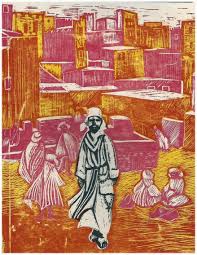 I think that we have lived a Nazareth warm and wet climate, but rich in experience of fraternity sharing a work of reflection and manual, no matter the origin of each one or its status ecclesial: be brothers is be equal between us. Jesus thus let it us very clear in his words and his life. Charles of FOUCAULD had that intuition and experience throughout his life and their searches. it may seem like an obsession in him through his writings and letters, identifying with people and their problems, looking for the place where no one wanted to be, with the continuous challenge – powered by his faith and his friendship with Jesus- go below, dreaming of realizing Jesus among the latters. But it is a call to our lives, to our realities, as Church and as priests at the service of the people, trying to our role as “officials” not to catch the vocation of servers and proclaimers of the Good New.
I think that we have lived a Nazareth warm and wet climate, but rich in experience of fraternity sharing a work of reflection and manual, no matter the origin of each one or its status ecclesial: be brothers is be equal between us. Jesus thus let it us very clear in his words and his life. Charles of FOUCAULD had that intuition and experience throughout his life and their searches. it may seem like an obsession in him through his writings and letters, identifying with people and their problems, looking for the place where no one wanted to be, with the continuous challenge – powered by his faith and his friendship with Jesus- go below, dreaming of realizing Jesus among the latters. But it is a call to our lives, to our realities, as Church and as priests at the service of the people, trying to our role as “officials” not to catch the vocation of servers and proclaimers of the Good New.
 The conclusions of the Assembly, expressed in the letter of Asia (Cfr Letter from Cebu, in www.iesuscaritas.org) us encourage to continue working each one in our fraternities and countries. Live with the style of Nazareth together with other cultures, religions or people with a thought different from our own, whether or not believers, showing who Jesus is our life. This helps us fidelity to several things; the fraternity, in our meetings, with the Revision of life, prepared properly; to the worship daily, as find personal with Jesus, although only is to feel its presence; to the day of desert monthly, with an atmosphere of silence from the moment in that it started, for let us search and find by the Lord; the deepening of the word with a prayerful and contemplative reading, as well as texts of the spirituality of the brother Charles; to delivery to the most disadvantaged in our Ministry and our ordinary life; to live the lifestyle of Nazareth as diocesan priests, without making much noise, sharing their joys and sorrows with the people, being always by his side. Brother Charles was a restless seeker believer that helps us to live the Gospel of Jesus with a spirituality of Nazareth which is not only a spirituality, but a space and time of our lives which makes us happy by sharing our interior in fraternity.
The conclusions of the Assembly, expressed in the letter of Asia (Cfr Letter from Cebu, in www.iesuscaritas.org) us encourage to continue working each one in our fraternities and countries. Live with the style of Nazareth together with other cultures, religions or people with a thought different from our own, whether or not believers, showing who Jesus is our life. This helps us fidelity to several things; the fraternity, in our meetings, with the Revision of life, prepared properly; to the worship daily, as find personal with Jesus, although only is to feel its presence; to the day of desert monthly, with an atmosphere of silence from the moment in that it started, for let us search and find by the Lord; the deepening of the word with a prayerful and contemplative reading, as well as texts of the spirituality of the brother Charles; to delivery to the most disadvantaged in our Ministry and our ordinary life; to live the lifestyle of Nazareth as diocesan priests, without making much noise, sharing their joys and sorrows with the people, being always by his side. Brother Charles was a restless seeker believer that helps us to live the Gospel of Jesus with a spirituality of Nazareth which is not only a spirituality, but a space and time of our lives which makes us happy by sharing our interior in fraternity.
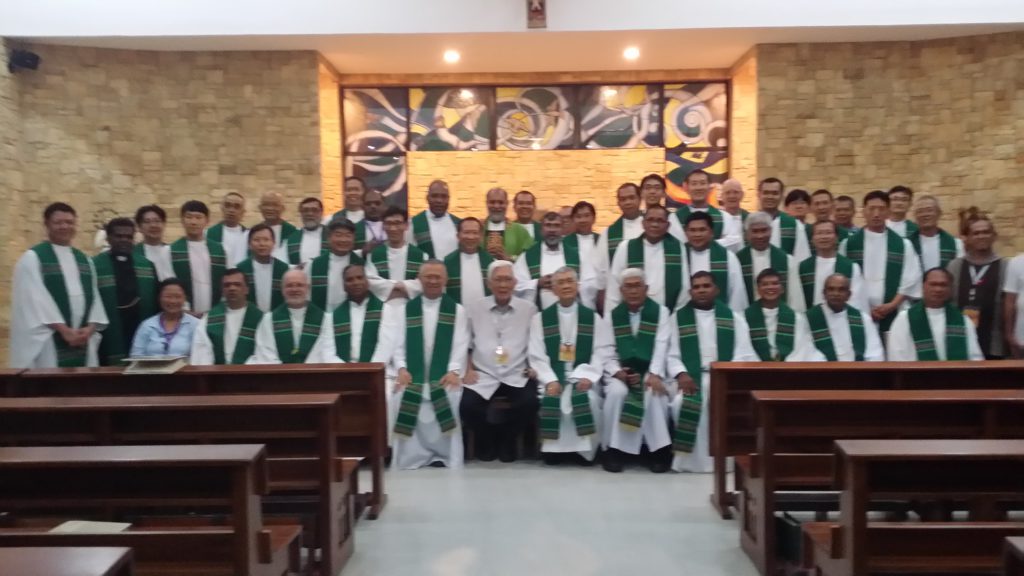 We recall the commitments as fraternities in Asia for the next years:
We recall the commitments as fraternities in Asia for the next years:
- Week of Spirituality in Pakistan in November 2017
- Month of Nazareth in the Philippines in July 2018
- Asian Assembly in Korea in October 2019 and
- World Assembly in Bangalore, India in January 2019.
Pray now to the Lord by all this and by each one of them brothers in the World.
Aurelio SANZ BAEZA, brother responsible
Perín, Cartagena, Murcia, Spain, 4 September 2016
(Canonization of Mother Teresa of Calcutta)
PDF: letter-from-aurelio-to-the-asian-brothers-4-september-2016
Our brother Abraham APOLINARIO, vicar general of Santo Domingo
The Archbishop of Santo Domingo, the diocese more ancient of America, in the Dominican Republic, Francisco OZORIA, of our fraternity, has appointed our brother Abraham APOLINARIO vicar general.
For all it’s a good new, and we wish for him all success in his work and God’s help.
A hug from all brothers in the World!



